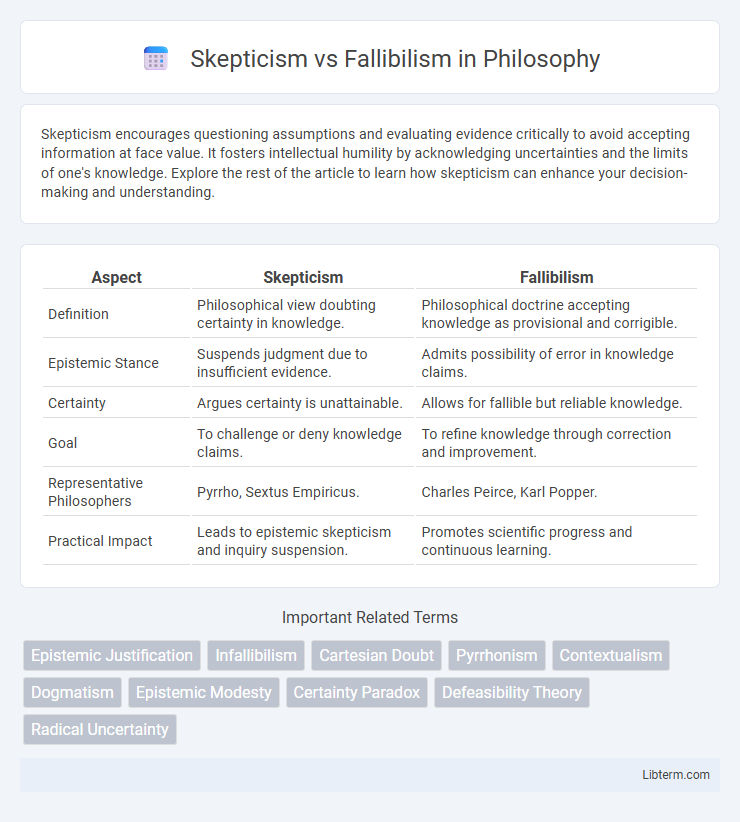Skepticism encourages questioning assumptions and evaluating evidence critically to avoid accepting information at face value. It fosters intellectual humility by acknowledging uncertainties and the limits of one's knowledge. Explore the rest of the article to learn how skepticism can enhance your decision-making and understanding.
Table of Comparison
| Aspect | Skepticism | Fallibilism |
|---|---|---|
| Definition | Philosophical view doubting certainty in knowledge. | Philosophical doctrine accepting knowledge as provisional and corrigible. |
| Epistemic Stance | Suspends judgment due to insufficient evidence. | Admits possibility of error in knowledge claims. |
| Certainty | Argues certainty is unattainable. | Allows for fallible but reliable knowledge. |
| Goal | To challenge or deny knowledge claims. | To refine knowledge through correction and improvement. |
| Representative Philosophers | Pyrrho, Sextus Empiricus. | Charles Peirce, Karl Popper. |
| Practical Impact | Leads to epistemic skepticism and inquiry suspension. | Promotes scientific progress and continuous learning. |
Introduction to Skepticism and Fallibilism
Skepticism questions the possibility of certain knowledge, emphasizing doubt and the critical evaluation of beliefs. Fallibilism acknowledges human knowledge is inherently imperfect and subject to revision in light of new evidence. Both philosophies highlight the limitations of certainty but differ in their stance on the potential for justified true beliefs.
Defining Skepticism: Key Concepts and Origins
Skepticism originated in ancient Greece, primarily attributed to philosophers like Pyrrho and Sextus Empiricus, emphasizing systematic doubt about knowledge claims. Key concepts include suspension of judgment (epoche) and the challenge to the possibility of certain knowledge. This philosophical approach questions the reliability of sensory perceptions and reason, forming a foundation for ongoing debates in epistemology.
Understanding Fallibilism: Core Principles
Fallibilism asserts that human knowledge is inherently provisional and open to revision, emphasizing that no belief is beyond doubt. This principle recognizes the possibility of error in all claims, promoting continuous inquiry and evidence-based evaluation. Unlike skepticism, which often questions the possibility of knowledge itself, fallibilism maintains confidence in reasoned judgment while accepting its limitations.
Historical Perspectives: Skepticism vs Fallibilism
Historical perspectives on skepticism trace back to ancient Greek philosophers such as Pyrrho and Sextus Empiricus, who emphasized the suspension of judgment due to the uncertainty of knowledge. Fallibilism, prominently advanced by Charles Sanders Peirce and later Karl Popper, asserts that all claims to knowledge may be provisional and subject to revision, highlighting the enduring possibility of error in human understanding. The evolution from classical skepticism's radical doubt to fallibilism's tempered acceptance reflects a shift towards a pragmatic approach in epistemology focused on continuous inquiry and correction.
Main Arguments Supporting Skepticism
Skepticism emphasizes the impossibility of attaining certain knowledge due to the limitations of human perception and reasoning. It argues that since sensory experiences can be deceptive and logical reasoning is prone to error, absolute certainty remains unattainable. This position challenges claims of infallible knowledge, highlighting the inherent uncertainty in epistemic justification.
The Case for Fallibilism in Epistemology
Fallibilism in epistemology asserts that all knowledge claims are inherently provisional and subject to revision, emphasizing the possibility of error even in well-justified beliefs. Unlike skepticism, which doubts the attainability of knowledge altogether, fallibilism maintains that knowledge is attainable but fallible, promoting a more constructive approach to inquiry. This perspective supports scientific progress by encouraging continuous questioning and refinement of theories rather than outright rejection of knowledge claims.
Comparing Attitudes Towards Knowledge and Certainty
Skepticism emphasizes doubt and questions the possibility of certain knowledge, often withholding belief until absolute proof is attained. Fallibilism accepts that knowledge is inherently imperfect and recognizes that even well-supported beliefs may be revised in light of new evidence. This distinction highlights skepticism's cautious attitude versus fallibilism's openness to provisional understanding and continuous inquiry.
Common Misconceptions About Skepticism and Fallibilism
Common misconceptions about skepticism often confuse it with cynicism, wrongly portraying skeptics as dismissive of all knowledge rather than proponents of questioning and evidence-based belief. Fallibilism is frequently misunderstood as endorsing radical doubt, but it actually acknowledges human knowledge as provisional and open to revision without rejecting the possibility of justified beliefs. Both philosophies emphasize critical inquiry, yet skepticism rigorously tests claims while fallibilism accepts that errors can occur in any belief system.
Practical Implications in Philosophy and Science
Skepticism emphasizes doubting knowledge claims to avoid error, often leading to suspension of belief, which can inhibit decisive action in philosophy and scientific inquiry. Fallibilism accepts that knowledge is inherently uncertain yet advocates for provisional acceptance and continuous refinement of theories, fostering progressive research and practical problem-solving. This pragmatic tolerance of uncertainty supports innovation and adaptability in scientific methodologies and philosophical frameworks.
Conclusion: Bridging Skepticism and Fallibilism
Skepticism and fallibilism converge by acknowledging the limits of human knowledge while maintaining a commitment to inquiry and evidence. Skepticism rigorously questions certainty, whereas fallibilism accepts that knowledge claims might be mistaken but are tentatively reliable. Bridging these perspectives fosters a balanced epistemology that values doubt as a tool for continuous learning and critical thinking.
Skepticism Infographic

 libterm.com
libterm.com